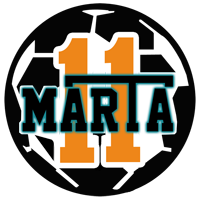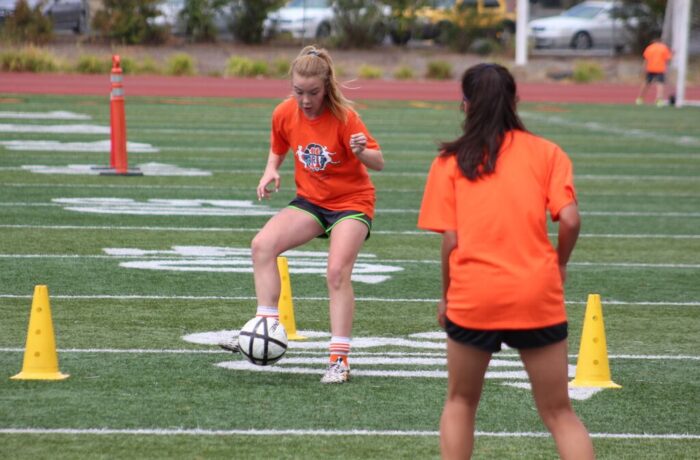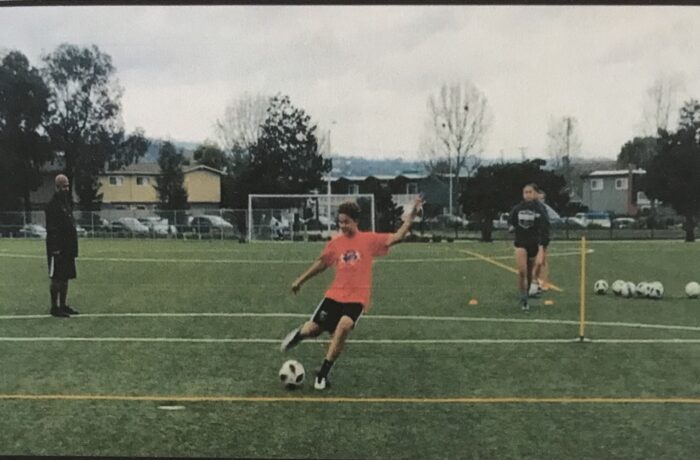It is often I hear…..this group can’t or won’t ever learn to play because they are playing at this level, or this is the group that will go further because they have a label (the athletes) that places them above one or two of the teams from the same age group or club. Sometimes to the point where those teams in the “so called” lower levels aren’t in existence. When I hear this type of talk, I cringe and it upsets me to hear the lack of confidence. As if a player at U8, U9, U10, etc. are in full control of how they will develop.
This is the talk of “so called” professionals, who basically throw in the towel on players. Why don’t certain programs continue to grow? Well, I believe it is because of this type of mentality or lack of believe, direction and approach to how and what is being taught or the lack of support from the club.
It is true that not many will end up being professionals, playing at a national level or college. But does this mean, they can’t learn to play this beautiful sport of “Futbol?” Whether a player (s) may not end up doing any of the above, I don’t believe that learning how to play Futbol is a farfetched expectation.
This expectation can be set to all levels (whether you are premier, gold, silver, bronze, etc.). The expectation to learn how to play the game and becoming a better player, I believe is something that can be accomplished. It starts with what the staff of the specific club/program believes in. I think about over the years, why have my players/teams grown in this sport, developed a passion and joy for Futbol. Each time I think about this, I come to these 5 points (no importance to the order):
- Belief in style of play/approach to the game: I’ve always loved skills and team play!!! Maybe because of the early introduction to Brazilian soccer on how they were able to mix the two and never lose the essence of the game. The objective is to score, so for me it comes down to how we are going to do this. Each coach/program should have their idea. Whatever that is….but the players should understand, what are your (the club/coach) expectations to how you want them to play. This is something that needs to be clear. If you’re going to play possession, controlling the ball, players utilizing their skill set…what are you focusing on during training (which I’ll get into shortly) that will help you achieve the style you want to implement. I’ll give you an example….I’m also a big fan of Barcelona, I believe in this style. Most recently I’ve been lucky to observe how Pep Guardiola, Tito Villanova (for a short stint, due to his passing), Gerardo Martino and now Luis Enrique have coached each of the teams, they’ve been responsible for. I was able to observe the differences that each brought to the game. But most importantly, you could see the essence to Barcelona, what makes them and their style. That has not been abandoned. There’s that belief in their style/approach to the game that in a way has guided each of these coaches, to maintain that identity they’ve created. That identity/style you can also observe it in their youth program (La Masia), it’s just at different pace.
- Training: I believe that the ball is everything, so since this is the case for me…..I must train my players to value the ball, take care of it and understand what they are able to do with it. I want to develop players that are creative, skillful, intelligent, which will allow them to play in control (possess), always looking for ways to penetrate towards the opponents goal. My trainings consist of my players constantly having the ball at their feet, whether passing/receiving, dribbling. There’s movement, players are expected to be mobile (and when I mean players, that’s all of them, including our goal keeper). I emphasize looking/creating triangles, diamonds, playing with your head up, communicating (helping paint that clear picture to your teammates). All players should have high soccer IQ. This approach then is taken onto the weekly games. We don’t change our approach, it is what we do and we look to impose our way, onto our opponent. But this only happens because of training…it is done throughout the week and applied at games during the weekend. As a coach I’m constantly trying to create as close to what my players will get in a match (always hard to do), challenging them physically, mentally and emotionally….things that they will face and experience in a match.
- Discipline: Maybe I’m old school, but this is one that I feel is lacking. I feel discipline is seeing as a negative. See it this way, without discipline you don’t have a focused player, respect, ability to value what you are doing, work ethic…..some values that are needed as we go and face the real world. If discipline is used wisely and communicated clearly, you can create an environment where players learn to believe, understand what the expectations are, so there aren’t confusions. An unfocused player at training, is unfocused during a match. Therefore; is unable to execute on the field. Discipline doesn’t require you to be inflexible, lack understanding, respect…..in fact is the contrary. My players understand where I’m coming from, what my expectations are as a coach. I try to paint a clear picture, I’m the person in charge of guiding you through your development. You as a player can’t and won’t come in to dictate how things are done. Does it sound harsh, I don’t think so….it’s expectations. Those that are parents have to do it daily. Discipline is a good thing!
- Consistency: There is a routine that my players follow during training and match days. This routine is created to give the players a reference point of coming in with a certain mindset, doing certain exercises, skills, that helps in preparing them for whatever they’re planning to do in training/matches. There’s also the consistency in delivering the message to the players on how athletes (soccer players) should behave; arriving on time, checking your player bag (making sure shoes, shin guards, water, etc. are in). Then there’s the message (depending on the age group), what will we be focusing in the next two weeks, month or for that specific season. You will obviously sound repetitive, but the object is to being consistent about what they are hearing and you asking of them. Once again, creating a clear picture for your players. Be Consistent!!
- Patience: I believe we all want to be or feel we’ve achieved success. But success doesn’t happen overnight. Our players must understand this. Our players will react to how, we as coaches (and Parents) react to certain situations. If we demonstrate impatience towards their development, then expect unrealistic expectations of themselves (as players), which then creates unnecessary pressure. You can set goals and have high expectations on how you want to do things, areas to improve, etc.; however, the coach must be realistic. You must look at the complete athlete (soccer player) and understand what their limitations may be, areas of strengths, cognitive and emotional maturity. Once you as a coach understands these things, I truly believe you will be able to gain the patience that is required to develop players. Development is a long term approach. We are dealing with youth players that need to understand that there are steps to take to being successful. And during these steps, there will be peaks and valleys.
These are 5 points/values that help me when thinking about how to approach developing the players I’m responsible for. Discipline/Consistency and Patience in a way fall on the same bucket. Establishing this to my approach as a coach, allows a smoother transition to training habits, which then helps in understanding the style we want to play.
As I mentioned earlier, this approach can be carried over to all levels. There isn’t a reason for a player in bronze, silver, etc. to not learn the skills necessary to play the game. It is our responsibility as clubs, coaches to create that environment that promotes learning and growth.



